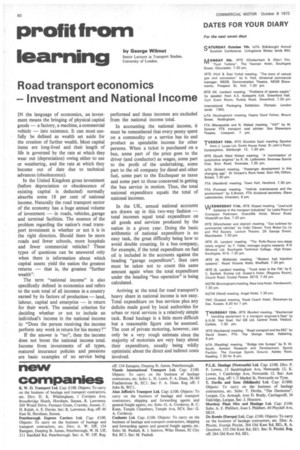profit from learning
Page 62

If you've noticed an error in this article please click here to report it so we can fix it.
by George Wilmot
Senior Lecturer in Transport Studies, University of London.
Road transport economics Investment and National Income
IN the language of economics, an investment means the bringing of physical capital goods a factory, a machine, a commercial vehicle into existence. It can most usefully be defined as wealth set aside for the creation of further wealth. Most capital items are long-lived and their length of life is governed by the rate at which they wear out (depreciation) owing either to use or weathering, and the rate at which they become out of date due to technical advances (obsolescence).
In the United Kingdom gross investment (before depreciation or obsolescence of existing capital is deducted) normally absorbs some 18 per cent of national income. Naturally the road transport sector of the economy has a huge annual volume of investment in roads, vehicles, garage and terminal facilities. The essence of the problem regarding the nation's road transport investment is whether or not it is in the right direction. Should there be more roads and fewer schools, more hospitals and fewer commercial vehicles? These types of questions can be answered only when there is information about which capital assets yield the nation the greatest returns that is, the greatest "further wealth".
The term "national income" is also specifically defined in economics and refers to the sum total of all incomes in a country earned by its factors of production land, labour, capital and enterprise in return for their work. The essential criterion for deciding whether or not to include an individual's income in the national income is: "Does the person receiving the income perform any work in return for his money?"
If the answer is "no", then the income does not boost the national income total. Income from investments of all types, matured insurance policies and pensions are basic examples of no service being performed and these incomes are excluded from the national income total.
In accounting the national income, it must be remembered that every penny spent on a commodity or a service has its end product as spendable income for other persons. When a ticket is purchased on a bus, some part of the price goes to the driver (and conductor) as wages, some part to the profit of the undertaking, some part to the oil company for diesel and other fuel, some part to the Exchequer as taxes and some part to those concerned in getting the bus service in motion. Thus, the total national expenditure equals the total of national incomes.
In the UK, annual national accounts are drawn up in this two-way fashion total incomes equal total expenditure on all goods and services produced by the nation in a given year. Doing the basic arithmetic of national expenditure is no easy task, the great difficulty being how to avoid double counting. In a bus company, for example, if the total expenditure on fuel oil is included in the accounts against the heading "garage expenditure", then care must be taken not to count this same amount again when the total expenditure under the heading "bus operation" is being calculated.
Arriving at the total for road transport's heavy share in national income is not easy. Total expenditure on bus services plus any deficits made good by local authorities for urban or rural services is a relatively simple task. Road haulage is a little more difficult but a reasonable figure can be assessed. The cost of private motoring, however, can only be a very rough estimate since the majority of motorists are very hazy about their expenditure, usually being wildly optimistic about the direct and indirect costs involved.






































































































